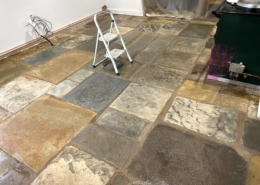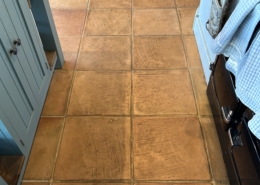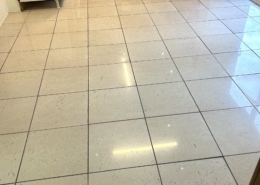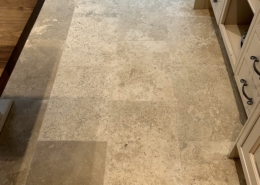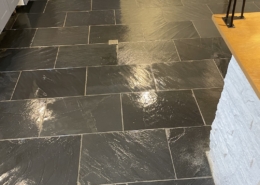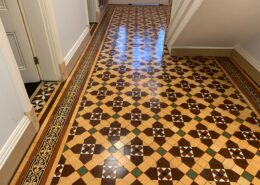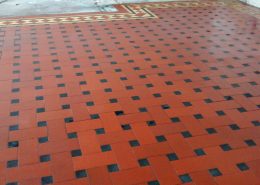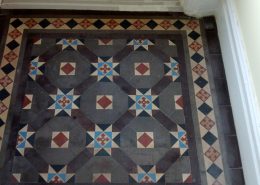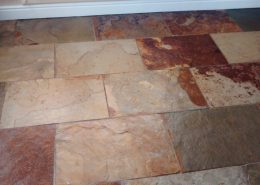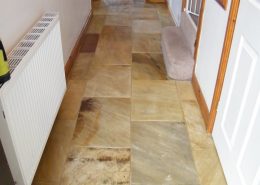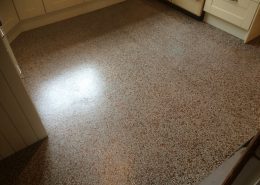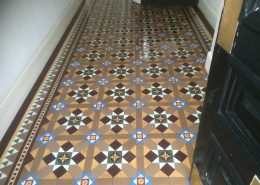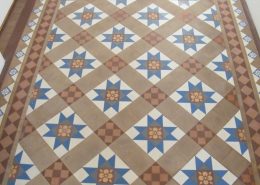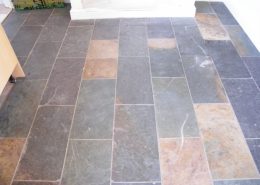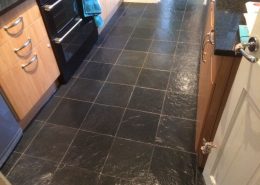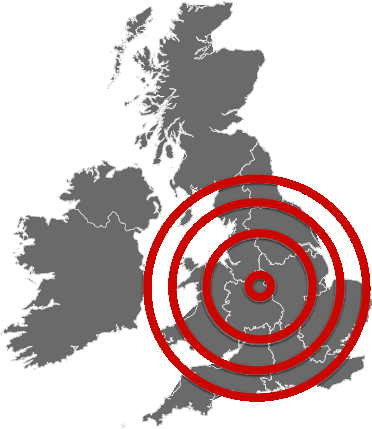Travertine Floor Cleaning & Restoration Lancashire
Travertine is a soft form of limestone. It makes excellent choice when used for tiled flooring and if properly maintained it will last for years. That said, it will easily damage if not cared for properly. If you need some help maintaining your travertine tiles why not call Tile & Stone Medic Lancashire today to see how we can help?
Common issues
Travertine flooring can be affected by a range of common problems, most are quite simple for an experienced professional to deal with.
Etching is one of the most common forms of damage to travertine floor tiles. Travertine is porous and easily marked by spillages of common household items like fruit juice, wine, tomato sauce and similar liquids. Etching refers to pale marks on the surface of the tile which are left behind after such a spillage. Etching can occur as a small patch of discolouration, or can cover several tiles depending on the scale of the spill.
Travertine tiling should always be sealed and is often polished too, whether that’s to a matt finish or more of a high sheen. Whatever the case, heavy footfall, moisture and general wear and tear will wear down the top surface of the tile over time. If you’ve noticed your flooring becoming generally duller it may need a fresh polish to bring it back to life.
Resealing is another common job needed to keep travertine tiles in good shape. Sealant forms a barrier against day to day wear and tear, but in protecting the tiles will gradually wear down. Ageing sealant may leave the travertine tiles looking dull, but it will also leave it more susceptible to staining, so you should always ensure the seal is topped up.
If the subfloor underneath your travertine tiles has not been laid properly, or was laid a long time ago, it can lose its rigidity. Movement in the subfloor will, over time, result in loose tiles. If unchecked the tiles may become seriously damaged with chips or cracks. Wear and degradation of the grout between the tiles also happens over time and leads to similar issues. If light coloured grouting has been used it will also show dirt more easily, this dirt can also be trodden into the tiles and leave unsightly marks.
How we maintain travertine tile flooring
We employ a range of techniques to repair damaged or aged travertine floors. In the case of etching, we’d first need to assess the seriousness of the damage. Generally our technique involves using a specialist polish solution to lightly buff out visible damage, before applying a final polish and a reseal.
For travertine tile floors which have dulled, a simple finishing polish might be all that is required to bring life back to the tiles. Polishing can be tailored to your specification depending on the finish you’d like, tiles could be left matt or taken to a higher level of shine. We’d strongly recommend finishing with a sealer to help guard against future staining from spillages and general daily abrasion. The sealer should be topped up approximately once a year to maintain this protection.
In the case of badly damaged tiles with chips or cracks we we would need to make a thorough assessment of the damage to the travertine before we decide on a solution. It may be the case that a tile needs to be wholly replaced, in which case we can help with sourcing replacement stone.
Will repairing my travertine tiles cause disruption?
We always try to fit our repairs around you and cause an absolute minimum of inconvenience to you and your environment. Repair of travertine tile flooring which has suffered staining or dulling can generally be completed in a few hours. Repairs don’t usually involve large or noisy pieces of machinery and the strongest chemicals used would be mild alkali, so you can expect work to be carried out in the safest way possible. You can rest assured the job will be completed efficiently so you can get back to enjoying your travertine floor.
If your travertine floor tiles need some care and attention then don’t hesitate to get in touch with Tile & Stone Medic Lancashire today for all your maintenance and repair needs!
FAQs
Whilst we may use specialist chemicals in the course of our work, we can assure you that by the time we leave all residues will be gone and your tile or stone flooring will be perfectly safe for everyone to use. We work to extremely high standards of health and safety, conducting proper risk assessments where appropriate and never putting you or anyone else in danger.
We always work in the most considerate way possible. Work will be tailored to your needs and will fit around your schedule where possible. We avoid bringing loud or bulky machinery into your home and when a job is complete we thoroughly clean up after ourselves to leave your space looking as tidy as it did when we arrived.



